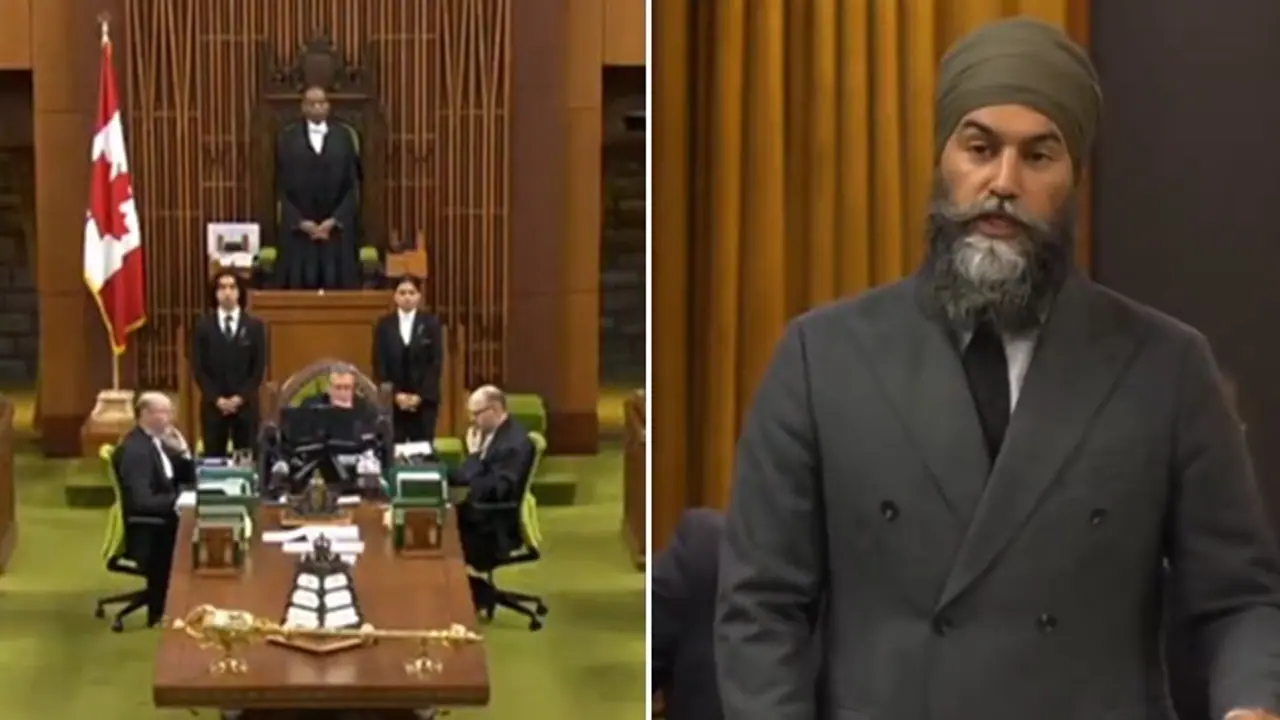Canadian Parliament bursts into laughter as Jagmeet Singh's "country first, party second" remark faces ridicule amid his push for an India-Canada committee during escalating diplomatic tensions.
In a dramatic session of the Canadian Parliament, New Democratic Party (NDP) leader Jagmeet Singh’s call for a "country first, party second" approach sparked laughter among lawmakers. The outburst occurred as Singh, a pro-Khalistan leader, advocated for the formation of a Canada-India parliamentary committee to investigate alleged interference by New Delhi in Ottawa's democracy. His proposal was promptly quashed by the House of Commons, as tensions between India and Canada continue to escalate over the killing of Khalistani terrorist Hardeep Singh Nijjar.

Singh, who has long championed the Khalistani cause, proposed the formation of a committee to examine India's alleged interference in Canadian affairs, citing Prime Minister Narendra Modi's government as a major player in undermining democracy.
“Every party in the House of Commons must show the government of India that we are a united front. That a government like Narendra Modi’s cannot find an ally in this Parliament willing to look the other way, and that we all take foreign interference incredibly seriously. I'm calling for the creation of a Canada-India committee, so parliamentarians can look into this important matter and propose additional steps the government can take to protect Canadians and our country." he said.
Many MPs saw irony in his words, particularly given Singh’s own alignment with pro-Khalistani elements, which have been a point of contention between the two countries.
Singh’s proposal comes amid a heated standoff between India and Canada over the June 2023 killing of Hardeep Singh Nijjar, a Khalistani terrorist designated by India. Nijjar’s death has soured diplomatic ties between the two nations, with Canada accusing India of involvement in his assassination, a claim India vehemently denies. The fallout has led to both countries recalling senior diplomats and downgrading diplomatic relations.
Singh doubled down on his claims of Indian interference, accusing Indian agents operating in Canada of working with local gangs, specifically the Lawrence Bishnoi gang, to target pro-Khalistani individuals. He also blamed the Conservative Party for rejecting his call for the India-Canada committee and accused them of having connections with Indian government-backed interference.
"I am disappointed that the Liberals shut down our attempt to bring in an India-Canada relations committee. What I'm disappointed by is that this is an ongoing trend with the Liberals...they've put up barricade after barricade to pursue foreign interference. I know that the work of this committee may not look good on the Liberals and on their inaction. But as our Prime Minister himself said that there are Conservative Parliamentarians who are directly connected to foreign interference coming from the Indian government, that needs to be taken seriously," he said.
The diplomatic row between the two nations intensified last week when India lashed out at Ottawa for its accusation that Indian diplomats were "persons of interest" in Nijjar’s murder investigation. India dismissed these claims as "preposterous imputations" and warned that the accusations were damaging the bilateral relationship. Canada, on the other hand, has insisted that it is conducting a thorough investigation into the matter but has yet to provide conclusive evidence linking India to the assassination.
In a tit-for-tat move, both countries have recalled six of their diplomats, signaling a serious deterioration in diplomatic ties. India has expressed its frustration with Canada’s reluctance to provide proof of its allegations, while Canada remains firm in its belief that India needs to address the presence of separatist elements on its soil.
Jagmeet Singh, sharing a clip of his parliamentary remarks on X, accused the Indian government of "hiring thugs to terrorize Canadians" and claimed that democracy in India was under threat.
Jagmeet Singh has been a vocal critic of the Indian government, particularly its handling of separatist movements. He has previously called for a ban on the Rashtriya Swayamsevak Sangh (RSS) in Canada, labeling it a "violent, militant, terrorist organization." Singh has also urged Canada to collaborate with allies like the United States and the United Kingdom to pressure India on this issue.
During his speech in Parliament, Singh reiterated his stance, saying, "There's got to be accountability. The Indian government has to be held to account. The Prime Minister Narendra Modi's government has to be held to account. We all need to be unified as Canadian leaders. All of us have to be united in denouncing PM Modi and making sure we protect Canadians and put their safety first and foremost."
The India-Canada diplomatic dispute has drawn international attention, with some observers noting that Singh’s role as a pro-Khalistan leader has exacerbated tensions. His continued push for sanctions on India and his repeated accusations of Indian interference are likely to further strain relations between Ottawa and New Delhi.
As both countries grapple with the fallout from the Nijjar assassination and the diplomatic escalations that followed, Singh’s proposal for a Canada-India relations committee appears to have fallen flat, at least for now. However, the broader implications of the growing rift between the two democracies remain uncertain, particularly as the Canadian government continues to pursue its investigation into Nijjar’s killing.
In the meantime, the laughter in the House of Commons over Singh’s "country first, party second" remark underscores the deep divisions within Canadian politics when it comes to addressing foreign interference and the role of separatist movements like Khalistan.
